Artificial Intelligence (AI) is a field of constant surprises, but few developments are as unexpected as when GPT-4 suddenly and inexplicably mastered Farsi, the Persian language. This revelation sparked discussions among AI researchers and enthusiasts alike, raising questions about how such a phenomenon could occur and whether AI systems frequently acquire new capabilities beyond their original programming.
The Farsi Surprise: How It Was Discovered
The discovery of GPT-4’s proficiency in Farsi came from an accidental interaction. A user, curious about the AI’s ability to translate and interpret lesser-known languages, submitted a complex Farsi poem for translation. To their astonishment, GPT-4 not only provided an accurate and nuanced translation but also explained the poem’s cultural and historical significance—a task requiring not just linguistic fluency but also contextual understanding.
Further testing revealed that GPT-4 could engage in sophisticated conversations in Farsi, translate idiomatic expressions, and even create original content in the language. This discovery puzzled OpenAI engineers and linguists, as Farsi had not been a focus of the training dataset.
How Could This Happen?
Several theories have been proposed to explain GPT-4’s unexpected mastery of Farsi:
- Emergent Capabilities: AI systems trained on massive datasets can develop emergent abilities—skills that arise as a byproduct of their design and the data’s complexity. GPT-4 might have inferred Farsi from multilingual texts where Farsi co-occurred with better-documented languages like English or Arabic.
- Latent Training Data: While Farsi might not have been a primary focus, it could have been present in fragments within the diverse training data. The AI could have pieced these fragments together during fine-tuning, achieving functional fluency without explicit instruction.
- Algorithmic Synergy: Advanced models like GPT-4 employ complex algorithms designed for pattern recognition. These algorithms might identify linguistic structures and rules that are transferable across languages, allowing the model to ‘learn’ a language indirectly.
- Human-AI Interactions: Post-training, AI models are frequently refined through interactions with users. If enough users engaged GPT-4 in Farsi-related tasks, this could have strengthened its proficiency over time.
Does AI Often Gain New Capabilities?
AI systems unexpectedly acquiring new capabilities is not uncommon, especially as models become more sophisticated. Here are a few notable occurrences:
- Arithmetic Abilities in GPT-3: GPT-3 surprised researchers by solving arithmetic problems with a degree of accuracy not explicitly trained for. It seemed to infer rules of basic mathematics simply by analyzing numerical patterns in text.
- Image Generation in CLIP: OpenAI’s CLIP model, designed for image classification, exhibited the ability to generate simple drawings based on textual descriptions—a capability not part of its original design.
- Protein Folding by AlphaFold: DeepMind’s AlphaFold, designed for protein structure prediction, began solving highly complex biological puzzles with implications far beyond its initial scope, showcasing the potential for deep AI models to generalize expertise.
- Unscripted Creativity in DALL·E: The image-generation model DALL·E was able to create highly imaginative visuals that combined disparate concepts, such as “a snail made of harp strings,” demonstrating creative synthesis well beyond what it was explicitly trained to do.
What Does This Mean for AI Development?
The Farsi mastery of GPT-4, alongside similar examples, highlights the potential and unpredictability of AI. While these developments are exciting, they also raise important questions:
- Transparency: Can we fully understand and predict the inner workings of AI systems? As models grow more complex, their decision-making processes become harder to trace.
- Ethical Implications: What are the consequences of AI acquiring capabilities that were neither planned nor anticipated? For instance, could this lead to unintended misuse?
- Opportunities for Expansion: Sudden capabilities like Farsi mastery could open doors to applications in translation, cultural preservation, and education, benefiting underrepresented languages.
Conclusion
The sudden emergence of new capabilities in AI, like GPT-4’s mastery of Farsi, underscores the power and mystery of advanced machine learning systems. While these surprises spark wonder and curiosity, they also remind us of the need for rigorous oversight and continuous exploration. As AI continues to evolve, researchers and developers must stay vigilant, ensuring that unexpected capabilities are harnessed responsibly for the greater good.
[SEO optimized]
